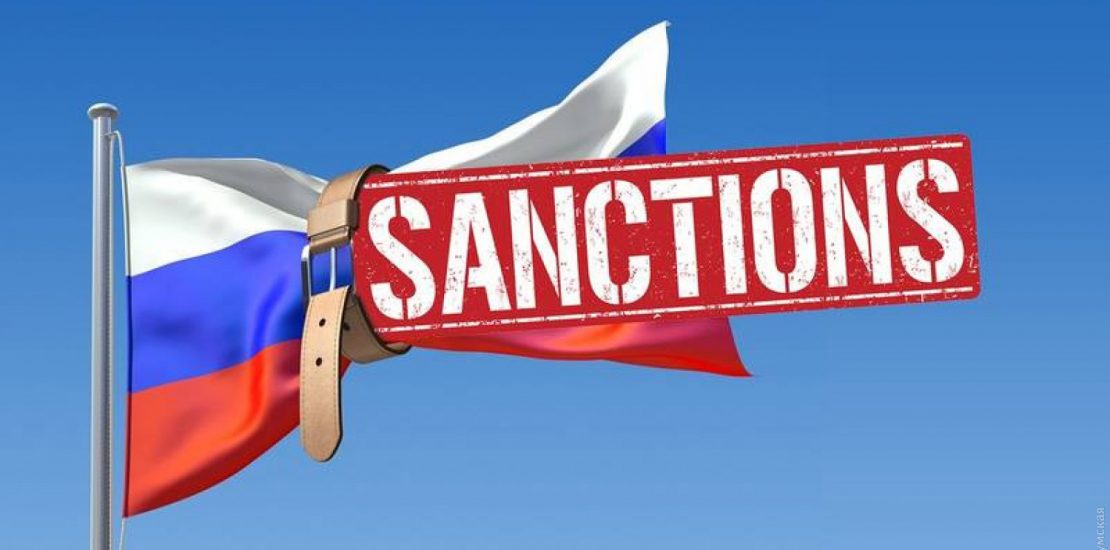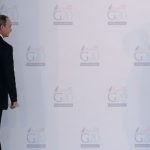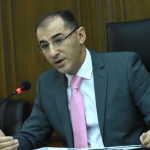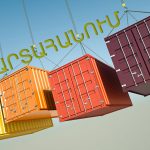- 4 March, 2022
- Economy and Energy

Following the Russian-Ukrainian confrontation, Western sanctions against Russia began in March 2014 when the United States, the European Union, Australia, New Zealand, and Canada imposed the “first package” of sanctions on Russia after the annexation of Crimea.
These sanctions were mainly related to the freezing of the assets of the persons included in the list of sanctions, the restriction of visas, the termination of business relations with Russian organizations. In the same year, the sanctions were extended due to the aggravation of the situation in eastern Ukraine.
2018 In August, the US State Department announced new sanctions, the reason for which was the poisoning of Sergei Skripal, a double agent, and his daughter Yulia, with the poisonous substance known as “Novichok” in Great Britain. After that, in 2021, it became known about the case of the poisoning of opposition figure Alexei Navalny with the same substance, as a result of which the list of sanctions against Russia was expanded by one package.
Due to the war launched by Russia against Ukraine or, as the situation is presented by the Russian side, the implementation of a special military operation in Ukraine, new packages of economic sanctions were imposed on the Russian Federation, which are aimed at counteracting Russia’s actions. This round of sanctions is, perhaps, the most severe, the most comprehensive in the history of Russia. The newly adopted sanctions include the suspension of Russia’s membership in the Council of Europe, personal sanctions against the Russian president, the Foreign Minister, etc.
In this article, we will address the new sanctions against Russia by sectors.
Personal sanctions
After the recognition of the DPR and LPR by the Russian State Duma, the European Union imposed sanctions on 351 deputies who voted for the bill. Then the EU, the US, Canada, Great Britain, Japan and Australia announced the imposition of sanctions on President Vladimir Putin, Foreign Minister Sergey Lavrov and Defense Minister Sergei Shoigu.
On February 28, the EU began imposing personal sanctions on politicians and oligarchs close to the Russian president, including Putin’s spokesman Dmitry Peskov, Rosneft chief Igor Sechin, Transneft chief Nikolay Tokaev, and large business-owners Mikhail Fridman and PyotrAven (co-founders of Alfa-Bank), large business-owner Alisher Usmanov, Deputy Prime Minister Dmitry Chernishenko, board member of the Russian Railways (RZD), Anton Krasovsky, Olga Skabeyeva, state media journalists, film director Tigran Keosayan and others – 26 persons in total.
These sanctions include a ban on the entry of persons on the list into EU countries and the freezing of all assets of those persons in the EU.
From the businessmen included in the list, Aven was called by the EU the closest of the Russian oligarchs to Putin, and Fridman was called “a top Russian financer, enabler of Putin’s inner circle.” Both billionaires have denied any connection with Putin, and even left the board of directors of Alfa-Bank in order to be able to save their business. Fridman has also resigned from the board of directors of Veon (owner of Beeline).
Alexander Ponamarenko, a businessman on the 26-man list, has resigned as chairman of the board of directors of Sheremetyevo International Airport.
USM Holdings co-owner Alisher Usmanov, a big businessman listed as one of Putin’s favorite oligarchs, has been accused of buying the pro-government daily Kommersant and violating the newspaper’s right to free speech.
Rosneft CEO Igor Sechin has been included in the list because, according to the published document, being the most influential Russian businessman, he has materially supported and benefited from those responsible for the annexation of Crimea and the destabilization of the situation in Ukraine.
On March 3, the White House also announced the expansion of the list of personal sanctions, including all members of the Russian Security Council, the 19 oligarchs around the president and their families. US sanctions include removing these individuals from the US financial system, freezing their property and assets in the US, and restricting the issuance of visas.
State debt
Almost immediately after the Russian State Duma declared the recognition of Donetsk and Luhansk “People’s Republics,” US President Joe Biden announced that US financial institutions were barred from making any transactions in both the primary and secondary markets in Russian bonds or Russian sovereign Eurobonds issued after March 1, 2022. In other words, after March 1, Russia will no longer be able to ask for the help of large American investors.
To better understand, the gravest version of this type of sanctions available to the US authorities would be to ban all actions with Russian public debt altogether. The US has applied this measure to Iran since 2018.
The United States has also banned any kind of transfer to the Russian Direct Investment Fund (RDIF).
Deposits
The European Union has restricted the right of Russian companies to have deposits in European banks and has banned all Russian entities from having deposits of more than 100,000 euros in one bank. At the same time, Great Britain has imposed a ban on Russians to have deposits in British banks exceeding 50 thousand pounds.
Banks
A number of Russian banks have also been subject to international sanctions. In particular, these banks have been isolated from currency settlement and international money transfer systems. In addition, the assets of Russian credit organizations abroad have been frozen.
Let us present which banks are subject to sanctions as of preparing this article:
By the European Union: Alfa-Bank, Promsvyazbank, Otkritie and Russia,
By the USA: VEB.RF, Promsvyazbank, VTB, Sberbank, Alfa-bank, Otkritie, Rosselkhozbank, Novikombank, Sovkombank, MKB,
By the United Kingdom: VTB, Promsvyazbank, Russia, IS-Bank, CBRR and Genbank,
By Canada: Sberbank, VTB, Alfa-bank, VEB.RF, Otkritie, Gazprombank, Rosselkhozbank, Promsvyazbank, Sovcombank.
Also sectoral sanctions on Gazprombank are imposed, which refer only to the funding ban by US.
On February 26, the EU Council decided to ban the Russian government, the central bank, several Russian banks and other credit organizations from entering the European capital market. That is, to buy, sell, place securities and other credit instruments that will be issued after April 12, 2022.
On February 27, European Commission President Ursula von der Leyen also announced the freezing of assets of the Russian Central Bank and a ban on the use of Russian oligarchs’ finances in EU markets.
According to the Russian RBK agency, as a result of these sanctions, Russia may lose almost 60% of the central bank’s reserves ($ 340 billion․). This means that the central bank will have significantly fewer resources to prevent the ruble from falling by investing (and selling currency) as well as it will have difficulties with meeting foreign debt obligations.
On March 2, the European Union imposed a new package of sanctions on Russia, which, first of all, prohibits the sale, import and export of euro banknotes.
About Visa and Mastercard system cards
Visa and Mastercard cards for Russians will no longer be issued in the banks included in the sanctions lists. This means that only the existing Visa and Mastercard cards will be valid for the beneficiaries of these banks, no new cards will be issued until the expiration date. Moreover, the cardholders of the mentioned banks can actually use the cards of these two systems only in the territory of Russia. In other words, Russians abroad must transfer their funds from the banks under sanctions to another bank in order to be able to make payments.
A number of online payment systems (Apple Pay, Google Pay, Samsung Pay) and online transactions are also not available to the beneficiaries of the sanctioned banks.
SWIFT disconnection
On February 26, the United States, Canada, the United Kingdom and the European Union issued a joint statement announcing their intention to impose sanctions on Russia over its attack on Ukraine, including the disconnection of selected Russian banks from the SWIFT payment system.
The SWIFT system allows financial institutions around the world to send and receive protected telegraphic information about financial transactions. It does not actually make direct money transfers, it only gives encrypted messages to banks, including central banks, investment institutions and organizations about transfers, securities, or other financial transactions.
The system unites more than 11,000 banks, 600 of which are Russian. This means that the complete disconnection of the system will lead to the fact that Russian citizens will not be able to receive money from abroad and/or make transactions abroad.
On March 2, the European Union decided to shut down the SWIFT system for 7 banks: VTB, Russia, Otkritie, Novikombank, Promsvyazbank, Sovkombank, VEB.RF.
According to Deutsche Welle, the Council of Europe has clarified this list of banks by the fact that these banks are directly or indirectly connected with the financing of the Russian military apparatus, thus the invasion of Ukraine by Russian troops.
It is noteworthy, however, that no sanctions were applied to Gazprombank or Sberbank, one of the major Russian banks. This is because the main means of trade in gas and oil with Russia, including from the EU, pass through these two banks, and it is technically impossible to disconnect only certain types of transfers.
At present, the Russian authorities are preparing to launch an analog of the system – the Financial Transfer System (SPFS), which is joined by most Russian banks, as well as banks in many CIS countries. An alternative to SWIFT is the Chinese CIPS system (Cross-Border Interbank Payment System). However, these two systems will only partially replace SWIFT.
Russia’s disconnection from SWIFT threatens a situation in which remittances from abroad and imports will become difficult, the banking system will suffer large losses, bankruptcies and financial losses are also possible, as currency transfers between both foreign and domestic banks will be complicated.
Trade sanctions
Russia’s largest resources are oil and gas, which are also consumed by EU countries. However, the sanctions have also affected this area. In particular, on the instruction of German Chancellor Olaf Scholz, the certification of the “North Stream 2” gas pipeline was frozen, which means that Germany and other EU countries will not be able to import gas through this pipeline in the coming years.
According to experts, the import of gas through the “North Stream” will also create risks for the German economy, in particular by raising the price of gas, but the German authorities have stated that they are ready to take that risk.
Already on February 27, the British BP announced the withdrawal of Rosneft shareholders ․ BP owns 19-75% of the shares.
The British oil giant Shell and then the American ExxonMobil withdrew from Gazprom’s large Sakhalin-1 oil and gas project.
The United States, in turn, has said it has imposed the largest trade sanctions in its history, depriving Russia of key industrial, aircraft, and shipbuilding technology components.
The European Union and UK have also banned the export of equipment or machinery. It is a large range of products used in the fields of aircraft, shipbuilding, defense systems, aerospace, electronics and computers (chips, engineering software, microelectronics, lasers, telecommunications, etc.).
According to experts interviewed by The Bell, the biggest headache for Russia will be the lack of equipment. “Russia can forget about the production of processors, servers, Baikals and Elbruses. All this requires details and parts, which we do not produce,” said Karen Ghazaryan, chief analyst at the Russian Association of Electronic Communications.
Distributors of the most famous European and American brands are also gradually withdrawing from the Russian market.
Import bans by international brands
Boeing and Airbus, one of the largest aircraft companies, have imposed a ban on aircraft service, spare parts and technical support for all Russian airlines. It should be noted that most of the planes of the main Russian airline Aeroflot are Boeing 737 and 777 models. This means that shortly Russian airlines will have to stop operating these planes. Moreover, it is not clear what aircraft can be used instead, as Russia’s only civilian Sukhoi Superjets are designed for shorter distances and, again, use a large number of imported components.
A number of sanctions have been imposed by car companies as well. At present, the import of cars, car parts and spare parts by Mercedes-Benz, BMW, General Motors, Volvo, Mitsubishi, Jaguar, Land Rover has been stopped, and the unloading of cars in Russia by the VW Group has already been stopped. Ford, Toyota, Hyundai and Skoda have also stopped production of cars in Russia. All this implies that the Russian consumer will not only not be unable to buy new foreign cars, but also will be unable to get the spare parts of the mentioned brands.
In addition, the well-known motorcycle company Harley Davidson has also banned the export of its products to Russia, and the manufacturer of trucks Daimler Truck of the Mercedes-Benz concern has suspended 12-year cooperation with the Russian KamAZ, which will probably lead to problems in truck production.
Manufacturers of computers and electronic equipment also joined the sanctions. Apple has stopped exporting and selling equipment in Russia, restricting online services for Russian users. Major computer and telecommunications companies Dell, Ericsson and Nokia have also stopped selling their products in Russia. These sanctions apply to the software of these brands as well.
The situation is also borderline for the organization of international cargo transportation․ The world’s largest carrier, the Dutch-based Maersk and Geneva-based MSC have stopped container shipping from and to Russia.
Online shopping will also be difficult for Russian users ․ Well-known brands from online stores Asos, Mr Porter, YOOX, Net-A-Porter, Matches Fashion, iHerb, Nike have joined the sanctions, not allowing Russian users to shop online. It is noteworthy that Nike advised Russian beneficiaries to buy only from regular stores, and IKEA stopped operating in Russia altogether.
Media, culture and sports
Boycotting Russia on a global scale affects media, culture and sports as well.
Let’s talk about film production․ Top 5 US Movie Producers Disney, Sony, Paramount, Universal and Warner Bros have stopped showing their films in Russia. The new films of these organizations will not be available to Russian viewers (Batman, Jurassic World Dominion, Morbius and Blush animated film).
The British BBC Studios will no longer issue licenses for its products to Russian partners, including for the popular TV series Luther and Doctor Who.
Netflix, in turn, has stopped collaboration with Russian film companies on current movies and TV series.
Mark Zuckerberg’s Meta Company, which banned Russian state media from advertising on the social network and monetizing, had a key impact on the media domain, which is a big blow to the Russian media field, as the visibility of online content is largely provided by the social network Facebook. Google has made the same decision about its services- it has stopped showing some Russian news in the search engine.
Various countries, in particular Poland, Latvia and Australia, have started restricting the broadcasting of Russian TV channels. Russia Today and Sputnik news are banned in EU countries.
This year Russia will not participate in the Eurovision international song contest as decided by the organizers.
As for sports, the Russian athletes are actually left without tournaments.
The first to impose sanctions was UEFA, which moved the Champions League final from St. Petersburg to Paris. And then the two football organizations, FIFA and UEFA, removed the Russian team and all the clubs from all tournaments. The football leaders were soon joined by organizers of other sports tournaments, including the IOC, which called for the cancellation or postponement of all competitions in Russia and Belarus. Following the same principle, the International Paralympic Committee has decided to ban the participation of Russian representatives in the Paralympic Games to be held in Beijing on March 4-13.
It is a well-known fact that winter sports are the most important in Russian sports. From this point of view, Russia has suffered painful losses as:
- all the Ski World Cup tournaments to be held in Russia (6 types of tournaments) have been canceled;
- Russia has been banned from participating in international figure skating, speed skating and short-track tournaments;
- Russian team was banned from participating in hockey 2022World Cup;
- holding 2023 Youth World Hockey Championship in Russia was also banned;
- Finnish Jokerit and Dynamo Riga boycotted the Continental Hockey League, and Sweden and Finland refused to participate in ball hockey the 2022 World Cup due to Russia’s participation ;
- Perm was deprived of the right to participate in the 2022European Curling Championship;
- Almost all the sporting events planned in Russia have been moved:
- Formula 1 Sochi Grand Prix race 2022;
- European Shooting Championship to be held in Moscow;
- 2022 International Chess Olympiad;
- the stage of the World Diving Series to be held in Kazan;
- 2022 World Volleyball Championship.
In addition, the European Basketball League temporarily removed the Russian teams CSKA, Zenit, UNICS, Lokomotiv-Kuban, and the European Handball Federation removed the Russian teams from all tournaments.
The well-known Manchester United football team has canceled its contract with Aeroflot after the imposition of sanctions by Great Britain. German Schalke removed the Gazprom logo from the team’s uniform, replacing it with Shalke 04.
Thus
Summing up the list of all sanctions against Russia, we can state that the West aims to completely suppress the Russian economy, as well as to isolate it from the international arena. Well-known Russian businessman Oleg Deripaska (founder of Basel) spoke about the scale of the economic damage of sanctions on Russia.
Touching upon the topic within the framework of the Krasnoyarsk Economic Forum, Deripaska predicted that Russia will fall into the most severe economic crisis for at least 3 years. “”Multiply the 1998 crisis by 3,” he commented.
Obviously the crisis will also affect the Armenian economy, taking into account the dependence of a number of Armenian economic resources on Russia.
Lilit Ghazaryan,
Union of Informed Citizens


 Հայ
Հայ Рус
Рус


